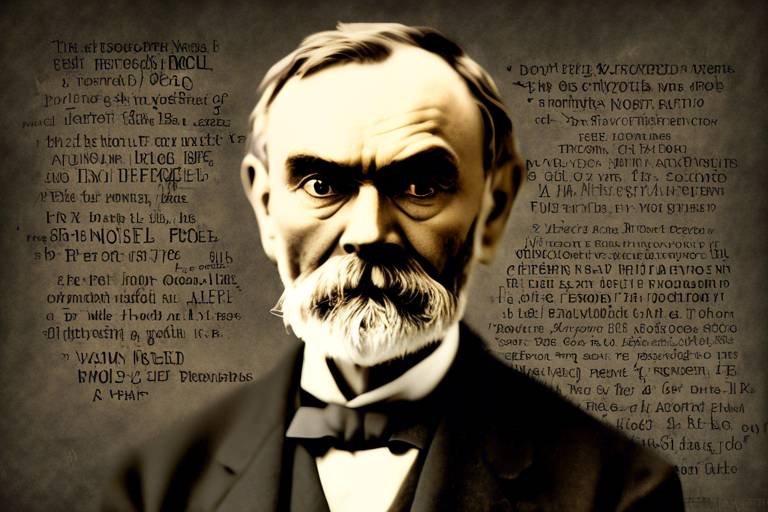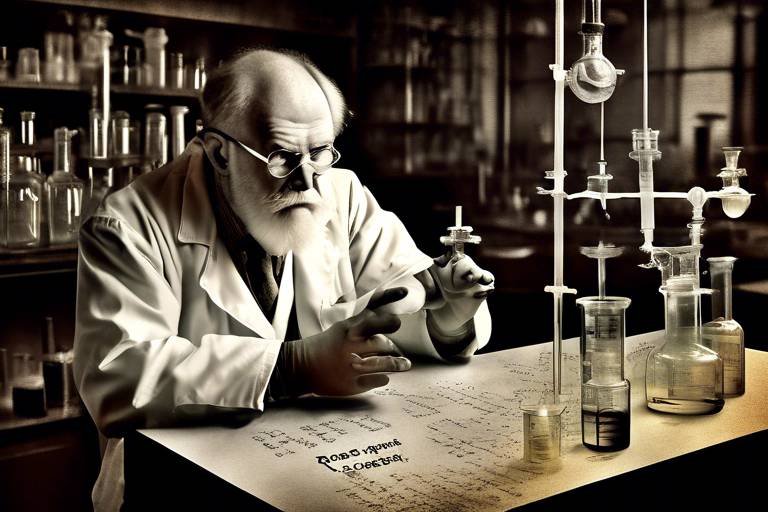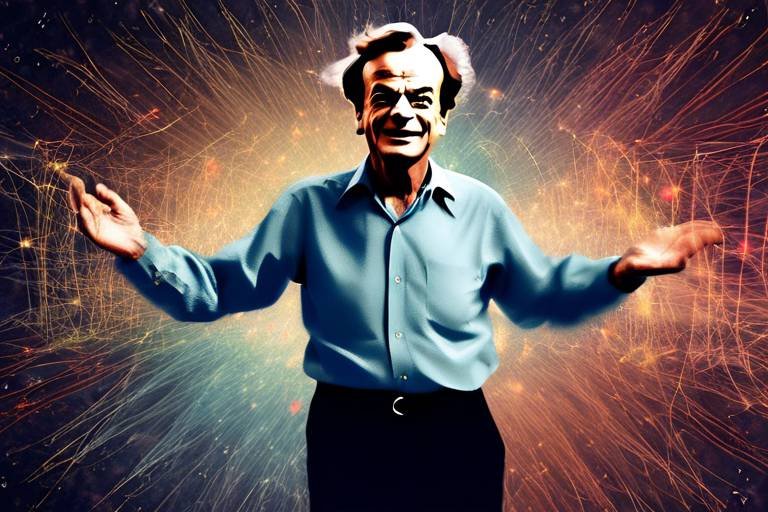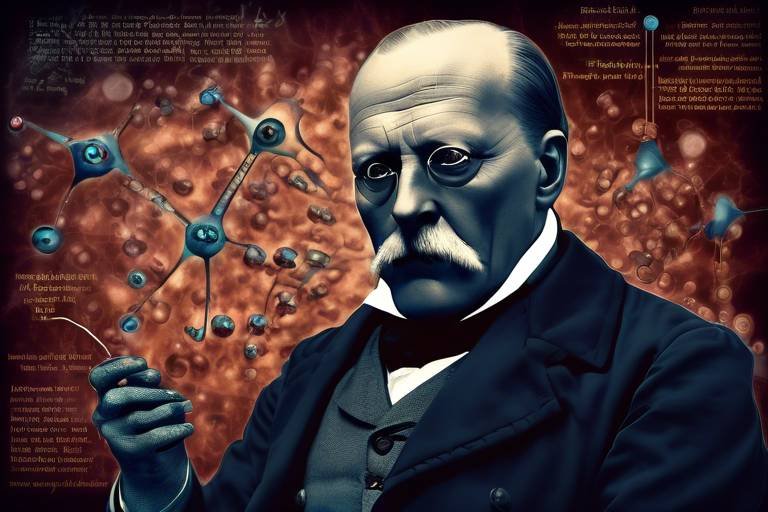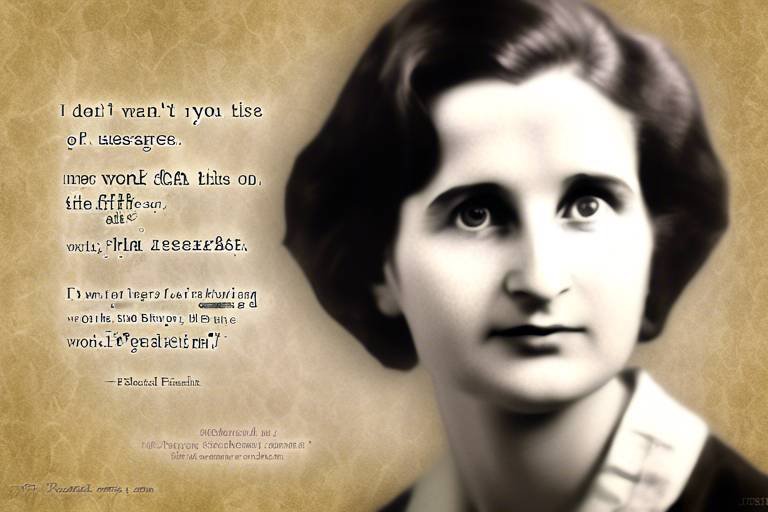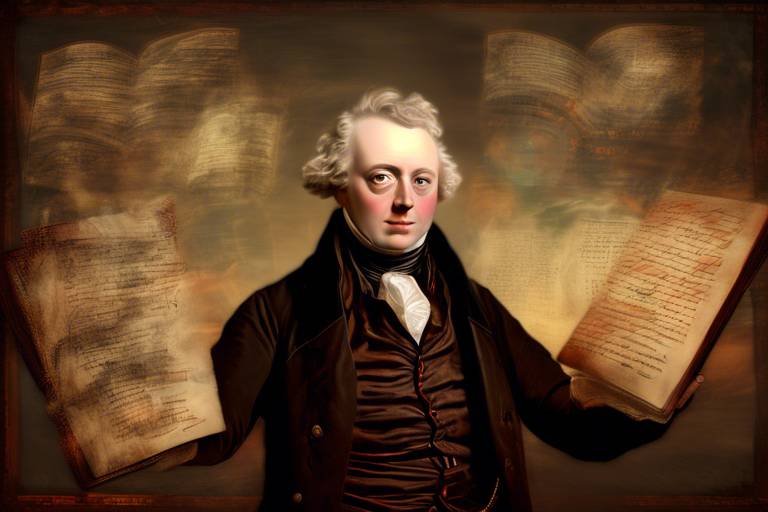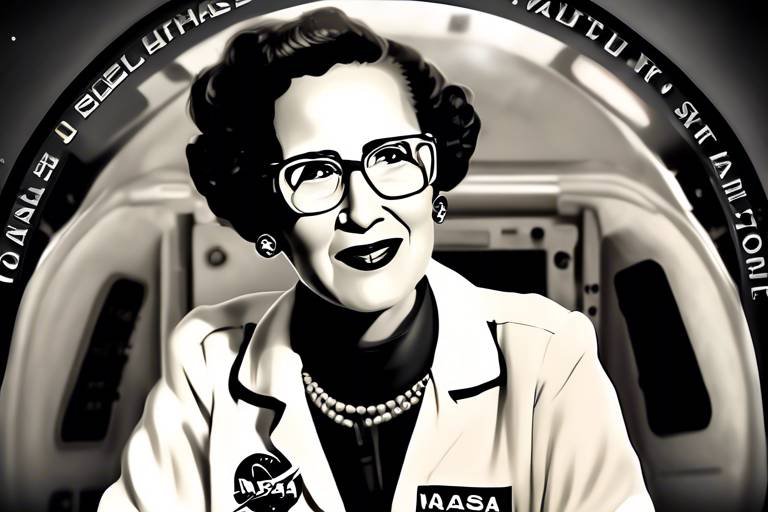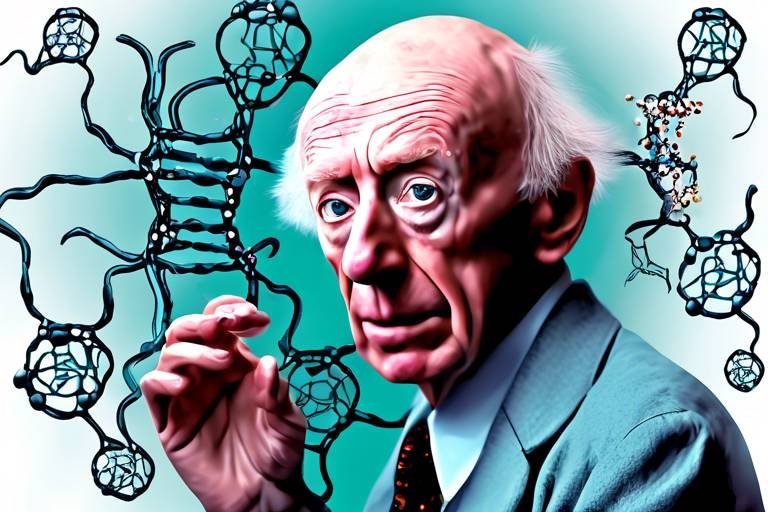The Life and Discoveries of Louis Pasteur
Louis Pasteur, a name that resonates through the corridors of science and medicine, was not just a scientist; he was a revolutionary thinker whose discoveries changed the world. Born on December 27, 1822, in Dole, France, Pasteur's journey from a humble beginning to becoming a pioneer in microbiology is nothing short of inspirational. His insatiable curiosity and relentless pursuit of knowledge led him to uncover the mysteries of germs and their impact on health, laying the groundwork for modern medicine.
Imagine a world where the causes of diseases were shrouded in mystery, where people succumbed to infections without understanding the invisible enemies at play. Pasteur stepped into this chaotic realm and illuminated the path to understanding. His groundbreaking work not only transformed scientific thought but also saved countless lives. Through his experiments, he demonstrated that microorganisms were responsible for fermentation and disease, fundamentally altering the way we perceive health and hygiene.
Pasteur’s contributions extend far beyond the laboratory. His pioneering work in developing the germ theory of disease provided a scientific explanation for infections, which was revolutionary at the time. Before Pasteur, many believed in the miasma theory, which attributed diseases to "bad air." Imagine the surprise when Pasteur showed that tiny organisms, invisible to the naked eye, were the culprits behind many ailments! This discovery laid the foundation for modern public health practices, emphasizing the importance of sanitation and hygiene.
Furthermore, his invention of the pasteurization process was a game-changer in food safety. By heating liquids to a specific temperature to kill harmful bacteria, Pasteur not only preserved food and beverages but also ensured they were safe for consumption. This simple yet effective method is still widely used today, demonstrating the lasting impact of his work.
In addition to his contributions to microbiology, Pasteur was a pioneer in the field of immunology. His development of vaccines, particularly for rabies and anthrax, showcased his innovative spirit and commitment to public health. The rabies vaccine, in particular, was a monumental achievement, as it provided a solution to a disease that had long been considered fatal. Pasteur faced numerous challenges in this endeavor, yet his perseverance paid off, ultimately saving countless lives.
As we reflect on Louis Pasteur’s extraordinary life, it’s essential to recognize the legacy he left behind. His work continues to influence modern science and medicine, and his methodologies remain integral to our understanding of disease prevention and treatment. Pasteur's story is not just one of scientific achievement; it is a testament to the power of curiosity, resilience, and the unwavering pursuit of knowledge.
- What is Louis Pasteur best known for?
Louis Pasteur is best known for his discoveries in microbiology, particularly the germ theory of disease and the development of vaccines for rabies and anthrax.
- How did Pasteur's work impact public health?
Pasteur's research led to improved sanitation practices and the understanding of germ-related diseases, significantly reducing the incidence of infections.
- What is the pasteurization process?
The pasteurization process involves heating food and beverages to a specific temperature to kill harmful bacteria, ensuring safety and preservation.
- When was the rabies vaccine developed?
The rabies vaccine was developed by Pasteur in 1885, marking a significant milestone in the field of immunology.

Early Life and Education
Louis Pasteur was born on December 27, 1822, in Dole, France, a quaint town nestled in the Jura region. From a young age, he exhibited a natural curiosity about the world around him. Growing up in a modest family, his father was a tanner, and this humble background instilled in him a strong work ethic and a desire to excel. Can you imagine a young boy, with his nose buried in books, dreaming about the mysteries of life? That's exactly how Pasteur's journey began.
His early education took place at the local primary school, where he showed remarkable talent in drawing and painting. However, it was not long before his interests shifted towards the sciences. He later attended the prestigious École Normale Supérieure in Paris, where he immersed himself in the study of chemistry and physics. It was here that he encountered influential mentors who would shape his scientific outlook. One of his notable professors, Jean-Baptiste Dumas, recognized Pasteur's potential and encouraged him to pursue research. This pivotal moment was like a spark igniting a flame of innovation in his mind.
During his time at École Normale, Pasteur's dedication to his studies was unmatched. He often spent long hours in the laboratory, conducting experiments and exploring the properties of various substances. His passion for science led him to obtain his doctorate in 1847, and this achievement marked the beginning of a prolific career. Pasteur's early work focused on crystallography, where he made groundbreaking discoveries regarding optical activity in tartaric acid, which later contributed to his understanding of molecular asymmetry.
As he progressed in his studies, Pasteur's inquisitive nature drove him to question existing scientific theories. He was particularly intrigued by the concept of fermentation, a process that had puzzled many scientists of his time. This curiosity laid the groundwork for his future contributions to microbiology. The way he connected the dots from his early education to his later discoveries is akin to a puzzle coming together, revealing the bigger picture of life itself.
Throughout his education, Pasteur faced numerous challenges, including financial constraints and health issues. However, his resilience and determination to succeed propelled him forward. He often reflected on his early struggles, which only fueled his desire to make a difference in the world. In his own words, "Science knows no country, because knowledge belongs to humanity." This belief would guide him as he embarked on a journey that would forever change the landscape of science and medicine.
In summary, Louis Pasteur's early life and education were characterized by a blend of curiosity, perseverance, and a thirst for knowledge. His formative years laid the foundation for his groundbreaking discoveries, and his story serves as an inspiration for aspiring scientists everywhere. Just like a seed that grows into a mighty tree, Pasteur's early experiences nurtured his intellect and passion, ultimately leading to monumental contributions in the field of microbiology.

Contributions to Microbiology
Louis Pasteur's contributions to microbiology are nothing short of revolutionary, fundamentally changing our understanding of the microscopic world. His meticulous research and innovative experiments laid the groundwork for what we now know about germs, fermentation, and infectious diseases. Imagine a world where the unseen forces of bacteria and viruses were merely a mystery; Pasteur peeled back the layers of this enigma, revealing the critical roles these microorganisms play in our lives. His work not only advanced science but also had profound implications for public health and safety.
One of Pasteur's most significant contributions was his work on the fermentation process. Prior to his experiments, many believed that fermentation was a chemical process. However, Pasteur demonstrated that it was, in fact, the result of living organisms. He showed that yeast was responsible for the fermentation of sugar into alcohol, while bacteria could spoil wine and beer by converting alcohol into vinegar. This revelation was pivotal, leading to advancements in food and beverage production. To illustrate his findings, here’s a simplified table of the different microorganisms involved in fermentation:
| Type of Microorganism | Role in Fermentation |
|---|---|
| Yeast | Converts sugars into alcohol |
| Bacteria | Can spoil alcohol by converting it into vinegar |
Furthermore, Pasteur's work extended beyond fermentation to the realm of infectious diseases. His research led him to propose the germ theory of disease, which posited that many diseases are caused by microorganisms. This was a groundbreaking shift in medical thought. Before Pasteur, diseases were often attributed to miasmas or "bad air." Pasteur's experiments provided compelling evidence that specific germs could lead to specific diseases, forever altering the course of medicine. He famously stated, "Microbes are everywhere; they are the cause of disease." This understanding laid the foundation for modern bacteriology and paved the way for hygiene practices that save countless lives today.
Moreover, Pasteur's dedication to his research was characterized by his methodical approach. He conducted numerous experiments that not only validated his theories but also showcased the importance of scientific inquiry. For example, he famously used swan-neck flasks to demonstrate that sterilized broth remained free from microbial contamination unless exposed to air. This experiment was crucial in debunking the theory of spontaneous generation and underscored the necessity of sterilization in medical and food practices. Pasteur’s work emphasized that cleanliness and proper sanitation could prevent disease transmission, which was a radical idea at the time.
In summary, Louis Pasteur's contributions to microbiology were groundbreaking and transformative. His discoveries regarding fermentation and the germ theory of disease reshaped scientific thought and practice. By revealing the invisible world of microorganisms, he opened the door to understanding how these tiny entities can have monumental effects on health and disease. Pasteur’s legacy continues to inspire scientists and medical professionals, reminding us of the power of curiosity and the importance of rigorous scientific research.
- What was Louis Pasteur's most significant discovery? Pasteur's most significant discovery was the germ theory of disease, which established that many diseases are caused by microorganisms.
- How did Pasteur contribute to food safety? He developed the pasteurization process, which kills harmful bacteria in food and beverages, ensuring their safety for consumption.
- What impact did Pasteur have on vaccination? Pasteur pioneered the development of vaccines, notably for rabies and anthrax, laying the groundwork for immunology.

The Germ Theory of Disease
The Germ Theory of Disease is one of the most revolutionary concepts in the history of medicine, and its roots can be traced back to the remarkable work of Louis Pasteur. Before Pasteur's groundbreaking discoveries, many believed that diseases were caused by miasmas or "bad air." However, Pasteur challenged this notion through rigorous experimentation and observation, demonstrating that specific microorganisms were responsible for causing various diseases. His pioneering research laid the foundation for modern microbiology and fundamentally changed how we understand health and illness.
At the heart of the germ theory is the idea that tiny, invisible organisms, which we now know as bacteria and viruses, can invade the body and cause illness. Pasteur's experiments provided compelling evidence for this theory. For instance, he studied the fermentation process and noticed that specific types of bacteria were responsible for the spoilage of wine and milk. This observation led him to hypothesize that similar microorganisms could be responsible for human diseases. His meticulous approach to science allowed him to connect the dots between the presence of these germs and the occurrence of illness.
To further validate his theory, Pasteur conducted a series of experiments, one of the most famous being the swan-neck flask experiment. In this experiment, he boiled broth in flasks with curved necks, which allowed air in but prevented dust and microorganisms from entering. The broth remained clear and free of contamination, proving that without exposure to germs, no spoilage occurred. This was a pivotal moment in demonstrating that germs were not spontaneously generated but rather came from existing microorganisms in the environment. The implications of this discovery were profound, leading to a shift in public health practices and a better understanding of disease prevention.
Pasteur's work not only provided evidence for the germ theory but also had practical applications that transformed medicine. The acceptance of this theory prompted significant changes in sanitation practices, particularly in hospitals and during surgical procedures. Medical professionals began to adopt sterilization techniques, which drastically reduced infection rates and improved patient outcomes. The germ theory also paved the way for the development of vaccines, as understanding the role of germs in disease allowed scientists to create targeted immunizations to prevent infections.
In conclusion, the Germ Theory of Disease, championed by Louis Pasteur, reshaped our understanding of health and illness. It challenged long-held beliefs and provided a scientific framework for combating infectious diseases. Today, we continue to build on Pasteur's legacy, employing his principles in modern medicine and public health initiatives. As we navigate the complexities of diseases in the contemporary world, Pasteur's insights remain as relevant as ever, reminding us of the importance of scientific inquiry and the relentless pursuit of knowledge.
- What is the Germ Theory of Disease?
The Germ Theory of Disease is the scientific theory that specific diseases are caused by microorganisms, such as bacteria and viruses.
- Who is Louis Pasteur?
Louis Pasteur was a French biologist and chemist renowned for his discoveries in microbiology and vaccination, including the Germ Theory of Disease.
- How did Pasteur prove the Germ Theory?
Pasteur proved the Germ Theory through experiments, such as the swan-neck flask experiment, which demonstrated that microorganisms cause spoilage and disease.
- What impact did the Germ Theory have on medicine?
The Germ Theory led to improved sanitation practices, the development of vaccines, and a better understanding of disease prevention, revolutionizing modern medicine.

Experiments and Evidence
Louis Pasteur was not just a scientist; he was a relentless investigator, a man who transformed the realm of microbiology through a series of groundbreaking experiments. His journey into the microscopic world began with a simple yet profound question: What causes fermentation and spoilage? To answer this, Pasteur embarked on a series of meticulous experiments that would ultimately lay the groundwork for the germ theory of disease.
One of his most famous experiments involved the study of spontaneous generation. At the time, many believed that life could arise spontaneously from non-living matter. To challenge this notion, Pasteur designed an elegant experiment using swan-neck flasks. He boiled nutrient broth in these flasks to kill any existing microorganisms and then left them exposed to air, but with a twist—the neck of the flask was curved, preventing dust and microbes from entering while still allowing air to circulate. After weeks of observation, the broth remained clear and free of microbial growth. However, when he broke the neck of the flask, allowing dust to enter, the broth quickly became turbid with microbial life. This experiment provided compelling evidence against spontaneous generation, demonstrating that microorganisms came from the environment, not from the broth itself.
Furthermore, Pasteur conducted experiments on the fermentation process, particularly with wine and beer. He discovered that different types of fermentation were caused by specific microorganisms. For example, he found that yeasts were responsible for alcoholic fermentation, while other bacteria caused spoilage. This revelation not only improved the quality of these beverages but also highlighted the importance of controlling microbial growth in various processes. His findings led to the development of the pasteurization process, which we still use today to eliminate harmful bacteria in food and drinks.
Another pivotal experiment involved the study of anthrax, a disease that plagued livestock and posed a significant threat to human health. Pasteur meticulously examined the life cycle of the anthrax bacillus, identifying its role in the disease's transmission. He demonstrated that by inoculating healthy animals with weakened forms of the bacteria, he could confer immunity against the disease. This groundbreaking work not only validated his germ theory but also laid the foundation for the field of immunology.
Through these carefully designed experiments, Pasteur built a robust body of evidence supporting the germ theory. His work was a clarion call to the scientific community, urging them to reconsider the relationship between microorganisms and disease. The implications of his findings were profound, leading to the adoption of sanitation practices and the establishment of public health measures aimed at controlling infectious diseases.
In summary, Pasteur's experiments were not merely academic exercises; they were pivotal moments in the history of science. They challenged existing paradigms, opened new avenues for research, and ultimately saved countless lives by promoting a deeper understanding of the invisible world around us. His legacy continues to resonate in modern medicine, underscoring the importance of rigorous scientific inquiry and evidence-based practices.
- What was Louis Pasteur's most significant contribution to science? Pasteur's most significant contribution was the establishment of the germ theory of disease, which linked microorganisms to illness.
- How did Pasteur's experiments change public health practices? His experiments led to improved sanitation measures and the development of vaccines, greatly reducing the spread of infectious diseases.
- What is pasteurization? Pasteurization is a process developed by Pasteur to heat liquids to a specific temperature to kill harmful bacteria without affecting the quality of the food or beverage.
- Did Pasteur create any vaccines? Yes, Pasteur developed vaccines for rabies and anthrax, pioneering the field of immunology.

Impact on Public Health
The acceptance of Louis Pasteur's germ theory was nothing short of revolutionary, fundamentally altering the landscape of public health. Before Pasteur's groundbreaking work, the prevailing belief was that diseases were caused by miasmas, or "bad air." This misconception led to ineffective and often harmful health practices. Pasteur’s discoveries shifted the focus to microorganisms, providing a scientific basis for understanding how diseases spread. As a result, public health policies began to prioritize sanitation and hygiene, leading to significant improvements in community health.
One of the most notable impacts of Pasteur's work was the implementation of rigorous sanitation measures in hospitals and public spaces. The idea that germs could be transmitted through contaminated surfaces, hands, and instruments prompted healthcare facilities to adopt cleanliness protocols that are now standard practice. For instance, the sterilization of surgical instruments and the use of antiseptics became commonplace, drastically reducing infection rates in surgical wards. This shift not only saved countless lives but also laid the groundwork for modern infection control practices.
Moreover, Pasteur's findings influenced the development of vaccines and immunization programs. By demonstrating that specific germs could cause specific diseases, he paved the way for the creation of effective vaccines. The introduction of vaccination against diseases like rabies and anthrax exemplified how understanding germs could lead to preventive measures that protect public health. Over time, these innovations have led to the eradication or control of many infectious diseases that once wreaked havoc on populations.
To illustrate the impact of Pasteur's work on public health, consider the following table that highlights key public health advancements stemming from his discoveries:
| Advancement | Description | Impact on Public Health |
|---|---|---|
| Sanitation Practices | Implementation of cleanliness protocols in hospitals and public spaces. | Reduced infection rates and improved patient outcomes. |
| Vaccination Programs | Development of vaccines for rabies and anthrax. | Prevention of disease outbreaks and increased immunity in populations. |
| Food Safety Regulations | Introduction of pasteurization in food and beverage industries. | Decreased incidence of foodborne illnesses. |
In summary, Louis Pasteur's contributions to microbiology and the subsequent impact on public health cannot be overstated. His research not only transformed how we understand disease transmission but also led to practical applications that have saved millions of lives. The principles of hygiene, sanitation, and vaccination that emerged from his work continue to be integral to public health today, serving as a testament to his enduring legacy.
- What is the germ theory of disease? The germ theory of disease posits that specific diseases are caused by specific microorganisms, fundamentally changing how we approach health and disease prevention.
- How did Pasteur's work influence modern medicine? Pasteur's discoveries laid the groundwork for sanitation practices, vaccination development, and food safety regulations, all of which are crucial to modern medicine.
- What diseases did Pasteur develop vaccines for? Pasteur developed vaccines for rabies and anthrax, both of which had significant public health implications.
- Why is pasteurization important? Pasteurization is a process that eliminates harmful bacteria in food and beverages, significantly reducing the risk of foodborne illnesses.

Pasteurization Process
The is one of the most significant contributions of Louis Pasteur to the field of food safety and public health. Developed in the 19th century, this method was designed to eliminate harmful bacteria from food and beverages, particularly in liquids like milk and wine. Imagine a world where your glass of milk could be a breeding ground for dangerous pathogens—Pasteur’s innovative technique turned that nightmare into a thing of the past.
At its core, pasteurization involves heating a liquid to a specific temperature for a set period of time and then rapidly cooling it. This simple yet effective method kills off harmful microorganisms without compromising the product's taste or nutritional value. Think of it as a protective shield for your food, ensuring that what you consume is safe and healthy. The process can be broken down into a few key steps:
- Heating: The liquid is heated to a temperature usually between 60°C to 85°C (140°F to 185°F).
- Holding: The liquid is maintained at this temperature for a specific duration, which varies depending on the type of liquid and the desired level of safety.
- Cooling: The liquid is then rapidly cooled to prevent any remaining bacteria from multiplying.
This technique not only extends the shelf life of products but also enhances their safety. For instance, milk that has undergone pasteurization can last significantly longer than untreated milk, making it a staple in households around the world. It’s hard to overstate how revolutionary this was; before pasteurization, the risk of foodborne illnesses was alarmingly high. Pasteur's work essentially laid the groundwork for modern food safety standards.
Beyond just milk, pasteurization has been applied to a variety of products, including juices, canned foods, and even beer. The widespread adoption of pasteurization has undoubtedly saved countless lives and reduced the incidence of foodborne diseases, making it a cornerstone of public health initiatives. In fact, many health organizations around the globe advocate for pasteurization as a critical measure to ensure food safety.
To illustrate its impact, consider the following table that highlights the reduction in foodborne illnesses attributed to pasteurization:
| Food Product | Before Pasteurization (Illnesses/100,000) | After Pasteurization (Illnesses/100,000) |
|---|---|---|
| Milk | 25 | 1 |
| Juice | 15 | 0.5 |
| Beer | 20 | 2 |
In summary, the pasteurization process is much more than just a method of heating liquids; it is a prime example of how scientific innovation can lead to monumental changes in public health. Louis Pasteur’s dedication to understanding microorganisms and their effects on food paved the way for safer consumption practices, ensuring that generations to come can enjoy their meals without fear of illness. His legacy in this area continues to resonate today, reminding us of the importance of science in our daily lives.
- What is pasteurization? Pasteurization is a process that involves heating liquids to kill harmful bacteria while preserving their quality.
- Who invented pasteurization? Louis Pasteur invented the pasteurization process in the 19th century.
- Is pasteurization necessary? Yes, pasteurization is crucial for ensuring food safety and preventing foodborne illnesses.

Vaccination and Immunology
Louis Pasteur's contributions to the field of vaccination and immunology are nothing short of revolutionary. His pioneering work not only laid the groundwork for the development of vaccines but also fundamentally changed how we understand and combat infectious diseases. Imagine a world where deadly diseases could be prevented with just a simple injection; that was the vision Pasteur brought to life. In the late 19th century, he embarked on a journey that would alter the course of medicine forever, using his scientific prowess to protect humanity from some of its most feared foes.
One of Pasteur's most notable achievements was the development of the rabies vaccine. In the 1880s, rabies was a terrifying disease, often resulting in death after a painful progression of symptoms. Pasteur faced numerous challenges in creating a vaccine that could effectively prevent the disease. His research involved painstaking experimentation, including the attenuation of the rabies virus, which meant weakening the virus so that it could stimulate an immune response without causing the disease itself. This was a delicate balance, akin to walking a tightrope, where one misstep could lead to failure. But Pasteur's determination paid off, and in 1885, he successfully developed the rabies vaccine, saving the life of a young boy who had been bitten by a rabid dog. This moment was not just a personal victory; it marked a turning point in medical history.
Pasteur's work didn't stop there. He also focused on developing vaccines for other infectious diseases, including anthrax. In 1881, he conducted a groundbreaking experiment involving sheep that demonstrated the efficacy of his anthrax vaccine. By inoculating a group of sheep with the vaccine and leaving another group unvaccinated, he was able to show that the vaccinated sheep were protected from the disease, while the unvaccinated ones fell ill. This experiment was a powerful testament to the potential of vaccination as a means of disease prevention. It was as if Pasteur had unveiled a hidden weapon in the fight against infectious diseases, one that would save countless lives.
The implications of Pasteur's work in vaccination extended beyond individual diseases. He opened the door to the field of immunology, which studies how organisms defend themselves against pathogens. His research laid the foundation for future scientists to explore the immune system's complexities and develop additional vaccines. Today, vaccines are a cornerstone of public health, preventing diseases such as measles, polio, and influenza. The legacy of Pasteur's work is evident in the vaccination programs that save millions of lives each year. In essence, he turned the tide against infectious diseases, creating a world where prevention is possible.
In recognition of his groundbreaking contributions, Pasteur received numerous accolades and honors during his lifetime, and his legacy continues to inspire scientists and healthcare professionals around the world. His work in vaccination and immunology not only saved lives but also fostered a greater understanding of how we can harness the power of science to protect public health.
- What diseases did Pasteur develop vaccines for? Pasteur developed vaccines for rabies and anthrax, significantly impacting public health.
- How did Pasteur's work influence modern vaccination? His research laid the foundation for the field of immunology and the development of numerous vaccines that prevent infectious diseases.
- Why is the rabies vaccine considered a milestone? The rabies vaccine was one of the first vaccines developed for a viral disease, showcasing the potential of vaccination as a preventive measure.

Rabies Vaccine Development
The story of the is one of determination, innovation, and a touch of drama that could rival any good novel. Louis Pasteur faced a daunting challenge when he turned his attention to rabies, a disease that was notoriously fatal and shrouded in mystery. In the late 19th century, rabies was a terrifying specter, claiming the lives of countless individuals, often following a dog bite. Pasteur, driven by his passion for science and his desire to save lives, embarked on a journey that would change the course of medicine forever.
In 1885, after years of meticulous research and experimentation, Pasteur successfully developed a vaccine for rabies. This achievement was not without its obstacles. One of the most significant hurdles was the need to prove that his vaccine was both safe and effective. Pasteur's approach was groundbreaking; he used the spinal cords of infected rabbits, which he then dried to weaken the virus. This method, while innovative, raised ethical questions and concerns about the safety of his vaccine. However, Pasteur remained undeterred, believing that the potential benefits far outweighed the risks.
To demonstrate the efficacy of his vaccine, Pasteur conducted a series of experiments that would ultimately earn him the trust of the medical community and the public. The most notable case involved a young boy named Joseph Meister, who had been bitten by a rabid dog. Faced with the grim reality of the situation, Joseph's mother sought Pasteur's help. In a dramatic turn of events, Pasteur administered his vaccine to the boy over a series of days, and against all odds, Joseph survived. This success story not only validated Pasteur's work but also marked a significant turning point in the fight against rabies.
Pasteur's rabies vaccine was a monumental achievement for several reasons:
- First Successful Vaccine: It was the first vaccine developed for a viral disease, paving the way for future vaccinations.
- Public Health Impact: The vaccine drastically reduced the number of rabies fatalities, transforming public health approaches to disease prevention.
- Foundation for Immunology: Pasteur's work laid the groundwork for the field of immunology, influencing future vaccine development.
As news of Pasteur's success spread, the rabies vaccine became a symbol of hope. It demonstrated the power of science to combat disease and save lives. Pasteur's innovative methods and unwavering dedication not only established him as a pioneer in the field of immunology but also earned him a place in the hearts of many. His work continues to inspire scientists and healthcare professionals around the world, reminding us of the importance of perseverance in the face of adversity.
In conclusion, the development of the rabies vaccine was not just a scientific breakthrough; it was a testament to Louis Pasteur's legacy as a champion of public health. His journey from a curious young boy in France to a revolutionary scientist serves as a powerful reminder of how one person's passion and determination can change the world. The rabies vaccine remains a cornerstone of preventive medicine, illustrating the lasting impact of Pasteur's contributions to science and humanity.
- What is rabies? Rabies is a viral disease that affects the central nervous system, leading to severe neurological symptoms and often death if left untreated.
- How is the rabies vaccine administered? The rabies vaccine is typically given in a series of shots over a few weeks, starting as soon as possible after exposure to the virus.
- Is the rabies vaccine safe? Yes, the rabies vaccine has been proven to be safe and effective, with minimal side effects in most individuals.
- What are the symptoms of rabies? Early symptoms include fever, headache, and general weakness, which can progress to anxiety, confusion, and agitation, eventually leading to paralysis and death.

Legacy and Recognition
Louis Pasteur’s contributions to science and medicine are nothing short of revolutionary, and his legacy continues to resonate in today's world. His groundbreaking research not only transformed our understanding of microorganisms but also laid the foundation for the fields of microbiology and immunology. Pasteur's work has saved countless lives, and his innovative approaches have inspired generations of scientists and healthcare professionals.
One of the most significant aspects of Pasteur's legacy is the establishment of the germ theory of disease, which fundamentally changed how we approach health and hygiene. Before Pasteur, many diseases were attributed to miasma or "bad air." His meticulous experiments debunked these myths, demonstrating that microorganisms could cause illness. This monumental shift in understanding led to improved sanitation practices and the development of vaccines, which have been crucial in controlling infectious diseases.
In recognition of his extraordinary contributions, Pasteur received numerous accolades during his lifetime. He was elected to the French Academy of Sciences and became a member of the National Academy of Medicine. Furthermore, Pasteur's work was instrumental in the founding of the Pasteur Institute in Paris, which remains a leading research center for infectious diseases and vaccines. The institute stands as a testament to his enduring influence, dedicated to advancing the science he pioneered.
Pasteur’s legacy extends beyond scientific achievements; it is also reflected in the numerous awards and honors bestowed upon him posthumously. Various institutions and organizations have named awards, scholarships, and even streets after him, ensuring that future generations remember his contributions. For instance, the Pasteur Medal is awarded to individuals who have made significant contributions to the fields of microbiology and immunology.
Moreover, the impact of his work can be seen in everyday life through the process of pasteurization, which is now a standard practice in food safety. This method has not only improved the quality of food and beverages but has also significantly reduced foodborne illnesses. The widespread use of vaccines, inspired by Pasteur's pioneering work, continues to protect populations worldwide from deadly diseases such as rabies and anthrax.
In summary, Louis Pasteur’s legacy is a remarkable blend of scientific innovation and public health advancement. His recognition as a pioneer in microbiology and immunology is well-deserved, and his work has paved the way for modern medical practices. As we continue to build on his discoveries, it is crucial to honor his contributions and remember the profound impact he has had on our world.
- What is Louis Pasteur most famous for?
Louis Pasteur is best known for developing the germ theory of disease and the process of pasteurization, which eliminates harmful bacteria in food and beverages. - How did Pasteur contribute to vaccination?
Pasteur developed vaccines for diseases such as rabies and anthrax, establishing him as a pioneer in the field of immunology. - What is the Pasteur Institute?
The Pasteur Institute is a research center in Paris dedicated to the study of infectious diseases and vaccines, founded in honor of Louis Pasteur. - Why is pasteurization important?
Pasteurization is crucial for food safety as it kills harmful bacteria, thereby preventing foodborne illnesses and extending the shelf life of products.
Frequently Asked Questions
- What were Louis Pasteur's major contributions to science?
Louis Pasteur made groundbreaking contributions to microbiology, particularly through his development of the germ theory of disease. He demonstrated that microorganisms are responsible for fermentation and disease, fundamentally changing the way we understand health and hygiene.
- How did Pasteur's work impact public health?
Pasteur's discoveries led to significant advancements in public health practices. His germ theory prompted improvements in sanitation and hygiene, which greatly reduced the spread of infectious diseases and laid the groundwork for modern medical practices.
- What is pasteurization, and why is it important?
Pasteurization is a process developed by Louis Pasteur to heat food and beverages to a specific temperature to kill harmful bacteria without compromising quality. This method is crucial for food safety, preventing spoilage, and extending the shelf life of perishable products.
- Did Pasteur develop any vaccines?
Yes! Pasteur was a pioneer in immunology and developed vaccines for several diseases, most notably rabies and anthrax. His work in this area has saved countless lives and established the foundation for modern vaccination practices.
- What challenges did Pasteur face during his research?
Throughout his career, Pasteur faced numerous challenges, including skepticism from the scientific community and the complexities of conducting experiments in a time when microbiology was still in its infancy. Despite these obstacles, his determination and innovative spirit led to monumental breakthroughs.
- How is Pasteur's legacy recognized today?
Louis Pasteur's legacy is celebrated worldwide through numerous institutions, awards, and public health initiatives named in his honor. His contributions to science and medicine continue to influence research and practices in microbiology and immunology.




